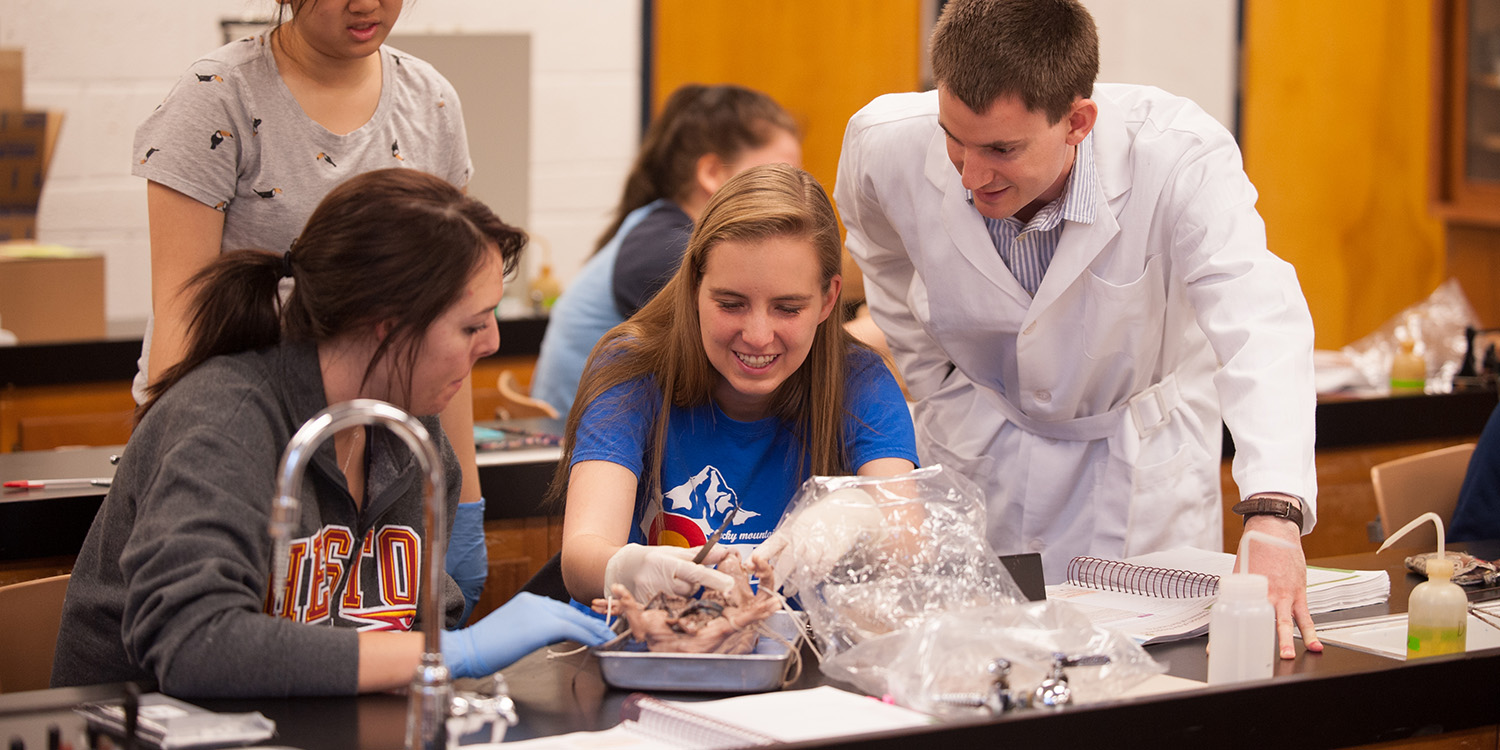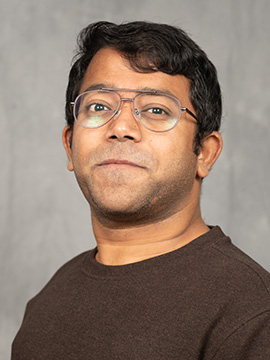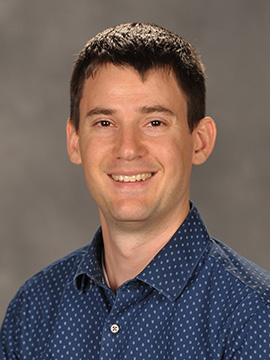Programs of Study click to expand
Biology
What is biology?
Biology is the study of life and living organisms. It is a good fit for students considering a career in medicine or a related field, as well as those intrigued with the living world who want to be prepared for any number of careers available in biology.
Success factors
If you are motivated, passionate and enjoy learning and understanding principles governing life processes at all levels – molecular, cellular, organismal and ecological – studying biology is for you!
— Hannah Weaver, class of 2014, physician assistant student at University of Oklahoma at Tulsa
Career possibilities
Programs of study are designed to prepare you for a number of career paths in biology:
Molecular/Cellular: Bioinformatics, Biotechnology, Forensic Science, Genetics, Microbiology, Neuroscience; Organismal: Animal Behavior, Botany, Entomology, Ornithology, Parasitology, Physiology, Mammalogy, Herpetology; Ecology/Conservation/Sustainability: Biological Systematics, Ecology, Oceanography and Marine Biology, Evolutionary Biology, Park Naturalist, Wildlife Biologist, Zoological Park and Aquarium; Health-related careers: Dentist, Optometrist, Pharmacist, Pharmacy Technician, Physical Therapist, Physician, Physician Assistant, Podiatrist, Veterinarian, Veterinary Assistant, Animal Caretaker; Education: Elementary and Secondary School Teacher, University Professor
Majoring in biology
Opportunities to serve as a tutor and department assistant, privileges normally reserved for upperclassment at most schools.
Biology Curriculum
The biology curriculum will provide you with the strong educational foundation you will need for upper-level studies and advanced degrees. Academic advisors work one-on-one with students to ensure requirements are met for a seamless transition to continuing education and professional careers.
Sample curriculum – associate degree in biology
Environmental Science
What is environmental science?
Environmental science is a growing field with employment opportunities in many different sectors from profit and nonprofit to healthcare and government industries.
Success factors
If you enjoy learning and trying to understand the complexity of our world – from biological processes to how humans affect nature – if you are eager to study about environmental problems and possible sustainable solutions that are influenced by social, political and economic aspects, studying environmental science is for you!
Career possibilities
Many career possibilities are available in the field due to an increasing demand for professionals with environmental science backgrounds.
- Agricultural scientist
- Botanist
- Ecologist
- Forest ranger
- Urban & regional planner
- Agricultural technician
- Engineering technician
- Forester
- Outdoor trip leader
- Environmental analyst
- Fund raiser
- Air pollution analyst
- Environmental consultant
- Environmental Educator
- Wastewater plant operator
- Project manager
- Natural resource specialist
- Environmental engineer
- Geophysicist
- Public health veterinarian
- Biologist
- Hazardous waste manager
- Range manager
- Biomedical engineer
- Environmental health specialist
- Environmental planner
- Resource economist
- Biotechnologist
- Environmental lawyer
- Industrial hygienist
- Seismologist
- Chemical technician
- Environmental lobbyist
- Journalist
- Author
- Photographer
- Soil conservation technician
- Environmental physician
- Environmental nurse
- Management consultant
- Environmental scientist
- Conservation systems analyst
- Chemist
- Meteorologist
- Oceanographer
- Hydrologist
- Microbiologist
- Geologist
- Conservation agent
- Teacher
- Biochemist
- Wildlife manager
- City planner
- EPA inspector
- Conservationist
- Zoologist
– Lisa Enns, class of 2013, Transportation Planner in Seattle, Wash.
Majoring in environmental science
- Field trips to a variety of sectors within the field
Environmental science curriculum
The environmental science program prepares the student to explore the relationships between humans and their environment in a proactive manner. The student employs problem-solving methods, data-search strategies, analysis, evaluation and prediction in the study of complex environmental issues. Academic advisors work one-on-one with students to ensure requirements are met for a seamless transition to continuing education and professional careers.
Sample curriculum – associate degree in environmental science
Health and Medical Occupations
How will Hesston College prepare me for future studies?
Hesston College offers an Associate of Science degree, a degree program that ensures ease of transfer into the four-year college or university health-related program of your choice. The Associate of Science degree is especially designed to fulfill the primary sequence of courses required for subsequent upper level health-related courses.
In addition you will complete a range of liberal arts courses, course work that provides a broadly based educational foundation. The liberal arts courses are similar to and meet most introductory general education courses at four-year institutions. After two years, you will have completed at least 60 college credit hours to earn the Associate of Science degree.
Programs of Study are designed to prepare you for a number of career-paths in Health and Medical Occupations such as:
- Physician’s Assistant
- Medical Technician
- Dental Hygiene
- Veterinary Technician
- Medical Technology
What courses will I take?
With a major in Health and Medical Occupations, you can choose courses from the following offerings: Cell Biology, Environmental Biology, Botany, Zoology, Anatomy and Physiology and Microbiology. Typical programs of study for the Associate of Science degree at Hesston College are listed.
But that’s not all. As a Hesston College Health and Medical Occupations major, you have opportunities to serve as tutors and departmental assistants, privileges normally reserved for upperclassmen at most schools.
Pre-dentistry
What is pre-dentistry?
Dentistry is a career field that requires degrees beyond a four-year undergraduate degree. The pre-Dentistry major is comprised of the basic courses required for an undergraduate degree in pursuit of more advanced degrees.
Success factors
If you are motivated, passionate and enjoy learning and understanding principles governing life processes at all levels – molecular, cellular, organismal and ecological – studying biology is for you!
Career possibilities
- Private practice
- Academic dentistry
- Public health dentistry research
- International health care
- Hospital dentistry
- Dental specialist
- Dental technician
- Dental hygienist
Majoring in pre-dentistry
Opportunities to serve as a tutor and department assistant, privileges reserved for upperclassmen at most schools.
Pre-dentistry curriculum
The pre-dentistry curriculum will provide you with the strong educational foundation you will need for upper-level studies and advanced degrees. Academic advisors work one-on-one with students to ensure requirements are met for a seamless transition to continuing education and professional careers. The curriculum follows a general biology curriculum.
Sample curriculum – associate degree in pre-dentistry
Pre-medicine
What is pre-medicine?
Medicine is a career field that requires degrees beyond a four-year undergraduate degree. The pre-Medicine major is comprised of the basic courses required for an undergraduate degree in pursuit of more advanced degrees.
Success factors
If you are motivated, passionate and enjoy learning and understanding principles governing life processes at all levels – molecular, cellular, organismal and ecological – studying biology is for you!
Career possibilities
- Physician
- Surgeon
- Medical specialist
- Physician assistant
- Veterinary medicine
- Pharmaceuticals
- Dentistry
– Chris Alliman, M.D., class of 1995
Majoring in pre-medicine
Opportunities to serve as a tutor and department assistant, privileges reserved for upperclassmen at most schools.
Pre-medicine curriculum
The pre-medicine curriculum will provide you with the strong educational foundation you will need for upper-level studies and advanced degrees. Academic advisors work one-on-one with students to ensure requirements are met for a seamless transition to continuing education and professional careers. The curriculum follows a general biology curriculum.
Sample curriculum – associate degree in pre-medicine
Pre-physical therapy
What is Pre-Physical Therapy
Physical therapists, along with physical therapist assistants and aides, help persons with injuries or illness improve their movement and manage their pain. These therapists are often an important part of rehabilitation and treatment for patients with chronic conditions or injuries.
Success factors
Important traits for students in this program include having an intellectual curiosity, the ability to adapt to situations, self-drive and compassion.
— Ryan Friesen, D.P.T, class of 1996
Career possibilities
- Physical therapist
- Physical therapy assistant or aide
Majoring in pre-physical therapy
Hesston College provides the opportunity to develop great one-on-one interaction with instructors. Students also have the opportunity to be involved with observation hours at local physical therapy clinics.
Pre-physical therapy curriculum
The pre-physical therapy curriculum will provide you with the strong educational foundation you will need for upper-level studies and advanced degrees. Academic advisors work one-on-one with students to ensure requirements are met for a seamless transition to continuing education and professional careers.
Sample curriculum – associate degree in pre-physical therapy
Pre-veterinary medicine
What is pre-veterinary medicine?
Pre-veterinary medicine is a career field that requires degrees beyond a four-year undergraduate degree. The pre-veterinary medicine major is comprised of the basic courses required for an undergraduate degree in pursuit of more advanced degrees.
Success factors
If you are motivated, passionate and enjoy learning and understanding principles governing life processes at all levels – molecular, cellular, organismal and ecological – studying biology is for you!
Career possibilities
- Teaching
- Researcher
- Zoological/Wildlife medicine
- Public health
- Regulatory medicine
— Mike Oesch, D.V.M., class of 1991
Majoring in pre-veterinary medicine
Opportunities to serve as a tutor and department assistant, privileges reserved for upperclassmen at most schools.
Pre-veterinary medicine curriculum
The pre-veterinary curriculum will provide you with the strong educational foundation you will need for upper-level studies and advanced degrees. Academic advisors work one-on-one with students to ensure requirements are met for a seamless transition to continuing education and professional careers. The curriculum follows a general biology curriculum.
Sample curriculum – associate degree in pre-veterinary medicine
Faculty
Department Mission Statement
The Hesston College Biology department educates students in the biological sciences, supplying biology and science majors with the training and knowledge to successfully advance in the discipline; provides allied health science majors, especially those in nursing, with the foundational knowledge and methodology of biology necessary to their vocation; and provides an experience in the integration of reason and faith to the general education student.
Learning Environment
The biology department is continually upgrading the laboratory equipment, especially as it relates to innovative computerized laboratory experiments. However, there is a constant emphasis on “hands-on” experiences – computers are used to analyze data, but the student still has to do the necessary “laboratory wet-bench work” that is essential in much of the biological work.
The laboratories are wonderful settings for students to interact and cooperate in laboratory projects. There are also group study sessions which bring students together in an informal setting to assist in course work. At least once a year there is a science division-wide gathering where students and faculty and spouses gather for an informal evening which usually includes a dinner, some get-acquainted activities and a lecture presentation by an invited guest.
Courses
- BiSc100 Introduction to Biology 4 hours
- BiSc103 Introduction to Molecular and Cellular Biology 4 hours
- BiSc104 Introduction to Ecology and Evolutionary Biology 4 hours
- BiSc105 Introduction to Organismal Biology 4 hours
- BiSc110 Environmental Biology 4 hours
- BiSc120 Environmental Science 4 hours
- BiSc205 Anatomy and Physiology 4 or 5 hours
- BiSc206 Microbiology 4 hours
- BiSc215 Pathophysiology 3 hours
- BiSc240 Genetics 4 hours




